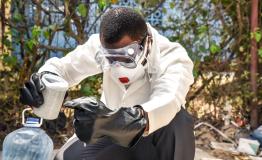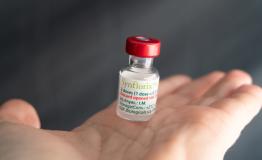

Uzbekistan
In 2020, in collaboration with the health ministry, we updated the national protocol to support the use of an all-oral short-course TB regimen with bedaquiline as a core component. Bedaquiline is a highly effective drug that has been proven to improve outcomes for patients. The protocol now also includes a section on palliative care for TB patients who have limited therapeutic options.
In our project in Karakalpakstan, we continued to roll out the latest evidence-based TB treatment guidelines across all 17 districts.

700
7
In September, we launched a new health promotion unit in Nukus, which will conduct awareness sessions in the community as well as health education and support groups for patients in TB facilities. Meanwhile, we are continuing our multi-site clinical trial, TB PRACTECAL, at two sites in Nukus and Tashkent to develop radically improved treatment for people with multidrug-resistant TB (MDR-TB) and extensively drug-resistant TB (XDR-TB).
During the global COVID-19 pandemic, we reinforced infection prevention and control measures in healthcare settings, and ensured continuity of care for our HIV and TB patients.
Innovative practices such as Video Observed Treatment (VOT) and Family-Directly Observed Treatment (F-DOT), in which health workers or family members watch the patient take their drugs, played an important role in supporting patients to adhere to their treatment during the lockdown.
We continue to strengthen outpatient models of care that are tailored to patients’ needs and requirements, and expect to roll out VOT and F-DOT further in 2021.
In 2020, MSF started cooperating with the World Health Organization and the Joint United Nations Programme on HIV/AIDS (UNAIDS) to implement the ‘one-stop shop’ model developed in Tashkent, in another region, Syrdarya. The ‘one-stop shop’ is a person-centred approach that allows people living with HIV to receive multidisciplinary care in the same location.
This is the first time that such an approach has been proposed and implemented in Central Asia.
No. staff in 2020: 310 (FTE) » Expenditure in 2020: €7 million MSF first worked in the country: 1997


MSF challenges COVID-19 myths with new quiz challenge app

MSF and TB activists disrupt opening of TB conference to protest drug corporations keeping life-saving medicines from people

Tips to De-Stress
